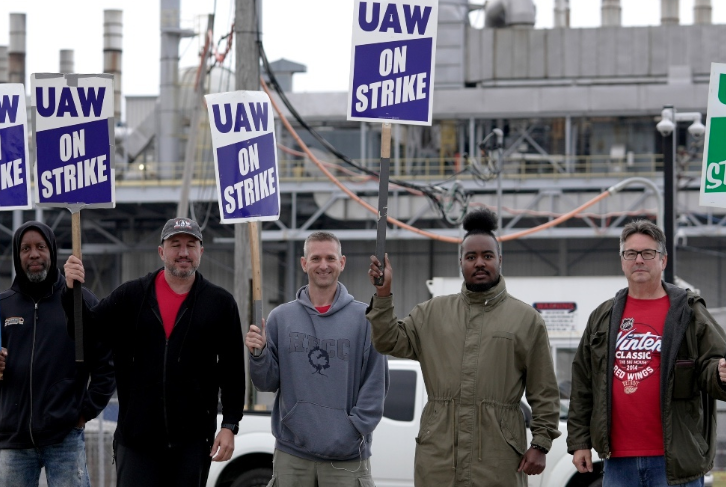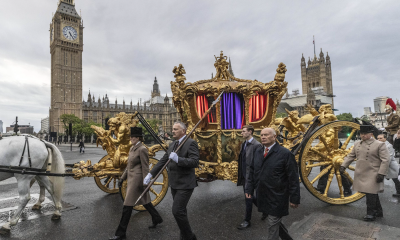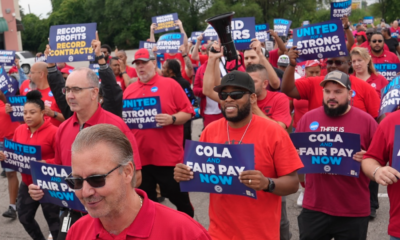NEWS
UAW Expands Strike As 7,000 More Workers Walk Out At Ford and GM
Published
7 months agoon

Courtesy of uaw.union/Instagram
The United Auto Workers union’s ongoing strike against Detroit’s “Big Three” automakers — General Motors, Ford and Stellantis — expanded on Friday against Ford and GM after the two companies failed to make substantial progress in negotiations over the past week, UAW President Shawn Fain said in a video announcement.
Fain said Friday that the announcement was delayed because the companies sent a “flurry” of offers “mere moments before our Facebook Live this morning.” Stellantis avoided additional walkouts after it made “significant progress” in negotiations, Fain said.
“Sadly, despite our willingness to bargain, Ford and GM failed,” Fain said.
An additional 7,000 members are walking off the job at noon at Ford’s Chicago Assembly Plant and GM’s Lansing Delta Assembly in Michigan, Fain said. They join 18,000 members at 41 facilities in 21 states who have already walked off the job.
The UAW expanded its “stand up” strike last week, with workers at 38 GM and Stellantis facilities walking off the job. Around 13,000 members initiated the strike the week before. The union represents nearly 150,000 workers at the Big Three.
The strike strategy involves members at targeted auto plants striking suddenly, while other members continue working under expired contracts. Members at other plants could be called to strike at a moment’s notice, and in the meantime are holding the line by refusing to work voluntary overtime, slowing production.
Ford had managed to avoid further strikes last week because the company made “some real progress” in negotiations, but on Monday the company announced it was pausing construction on a $3.5 billion electric vehicle battery plant in Marshall, about 100 miles west of Detroit.
“This is a shameful, barely veiled threat by Ford to cut jobs,” Fain said in a statement. “Closing 65 plants over the last 20 years wasn’t enough for the Big Three, now they want to threaten us with closing plants that aren’t even open yet. We are simply asking for a just transition to electric vehicles and Ford is instead doubling down on their race to the bottom.”
In Friday’s message, Fain also addressed violence against striking autoworkers on the picket lines, saying they’ve had “guns pulled on us, trucks and cars rammed through us.”
“We will not be intimidated into backing down by the companies or their scabs,” Fain said, referring to non-union workers crossing the picket line.
President Joe Biden traveled to Michigan on Tuesday to join workers on the picket line, with experts saying it is likely the first time a sitting U.S. president has walked a picket line with striking workers, though presidential candidates and lawmakers have done so.
Biden, the self-described “most pro-union president,” told UAW members that “the fact of the matter is that you guys, UAW, you guys saved the automobile industry” in the years surrounding the 2008 financial crisis.
“Folks, you’ve heard me say many times, Wall Street didn’t build this country, the middle class built this country, and unions built the middle class. That’s a fact, so let’s keep going. You deserve what you’ve earned, and you’ve earned a hell of a lot more than you’re getting paid,” Biden said.
UAW is demanding 40% wage increases, more paid time off, and increased retiree pay, along with the restoration of benefits the workers once had, including defined benefit pensions, retiree medical benefits and cost of living adjustments. The union also wants to protect members’ jobs in the transition to electric vehicles.
The union is also demanding the end of lower-paid employment tiers, a concession the Teamsters recently won in their new contract with UPS, in a deal that was reached under the threat of a strike. UAW is also seeking the right to strike over plant closures, and the “working family protection program,” which would have automakers pay workers to do community service work if their company leaves town.
According to UAW, GM, Ford and Stellantis made a combined $21 billion in profits in the first six months of 2023, after raking in $250 billion in North American profits over the last decade. Their CEOs saw average pay increases of 40% in the last four years, according to the union, while members’ wages only rose about 6%, with their real wages falling due to inflation.
TMX contributed to this article.
More From Auto Overload
-


Dump Truck Rollover Blocks Exit, Spills Dirt Onto Highway In…
-


Cars Line The Highway For Black Friday Outlet Mall Shopping…
-


Large Vehicle Flipped Over In Truckee, CA
-


Meet the Queen’s wheels: Britain’s Elizabeth will swap Land Rover…
-


Tesla Slams Through Wall And Into Pool, Three Occupants Rescued
-


Fiery car crash on Route 3 North in Braintree, MA
-


Semi-Truck Nearly Hits Wyoming Highway Patrol Trooper On Snow-Covered Interstate
-


11 Essential Items You Need To Keep In Your Vehicle
-


UAW Rejects Automaker Counteroffers As Strike Looms at Big 3
-


Bankruptcy Fears For Used Car Seller Carvana
-


Tesla S Owner Stranded on Christmas Eve Because Car won’t…
-


Build your own Ferrari Daytona (in Legos): Ultimate speed machine…

